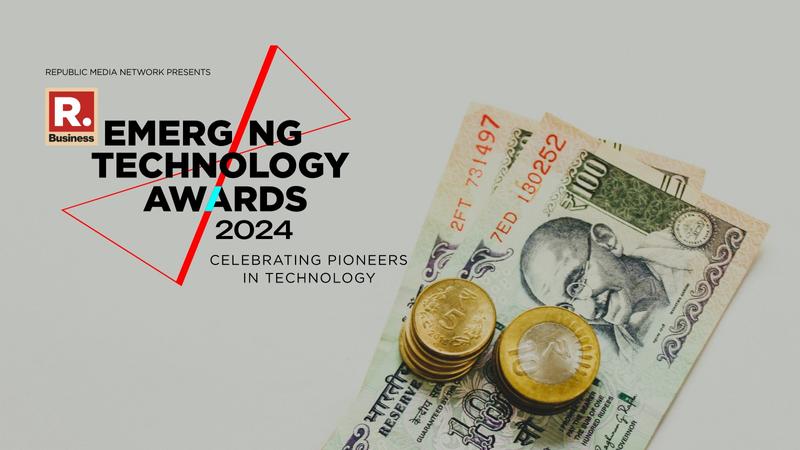Published 12:37 IST, April 19th 2024
Inclusive Banking for All: RBETA 2024 Set to Highlight India’s Sparkling BFSI Story
Technology is transforming the Banking, Financial Services, and Insurance (BFSI) sector in India, driving efficiency and accessibility.

India’s BFSI story: The Banking, Financial Services and Insurance (BFSI) sector is intricately linked to India's economic heartbeat. In FY22, the BFSI sector's share of Indian GDP increased to about 12 per cent. With the country's GDP set for growth, the BFSI sector is a key facilitator, positioned to thrive alongside the overall economic expansion.
To celebrate the growth, innovation, and tech enablers of India’s BFSI story, Republic Business is coming with its inaugural edition of the Republic Business Emerging Tech Awards 2024 (RBETA 2024).
The Banking industry in India has historically been one of the most stable systems globally, despite global upheavals. The health of the Indian banking system is robust, fortified by multi-year low non-performing loans and an adequate level of capital and liquidity buffers.
RBETA 2024 will honour the banking sector’s growth as a radical enabler for every citizen in the country. The event, marking innovation and entrepreneurship in the tech space, will shed light on the rise of India’s booming BFSI sector.
Industry Outlook
In FY23, the banking sector in India exhibited robust growth, with deposits reaching approximately $2.2 trillion and loans totalling around $1.67 trillion, resulting in a credit-deposit ratio of 75.8 per cent, the highest in three years.
The SCBs reported a notable credit growth of 15.4 per cent, marking an 11-year high, driven primarily by personal loans, services sector financing, and agricultural loans.
Particularly, personal loans surged by 20.6 per cent, mainly fueled by housing loans. Additionally, SCBs expanded their footprint with a 4.6 per cent increase in new branch openings, especially in Tier 4, 5, and 6 centres.
The MSME sector experienced significant credit growth, averaging over 30.6 per cent, supported by government initiatives like the Emergency Credit Linked Guarantee Scheme (ECLGS). This sector's share in gross credit uptake expanded from 17.7 per cent in January 2020 to 23.7 per cent in November 2022, underscoring its growing importance in the industry.
Expansion with improving asset quality
The population covered with bank accounts increased from 53 per cent in FY 16 to 78 per cent in FY 21. For the first time, the Gross Non-Performing Asset (GNPA) of SCBs has decreased to a 7-year low of 5 per cent in Sept 2022, and the Net NPA has declined to a 10-year low of 1.3 per cent.
Banks' gross non-performing asset (GNPA) ratio continued to improve in the second quarter of the FY24, easing to 3.2 per cent as of end-September, the Trend and Progress in Banking report released on Wednesday showed.
More than 1.6 Lakh bank branches are translating to approximately 15 branches per 1 Lakh of population. This is further complemented by a network of 2.17 lakh ATMs, out of which 47 per cent are in rural and semi-urban areas. Banking services have been made accessible to every village within a 5 km radius in 25 states and 7 Union Territories covering 99.94 per cent of villages.
Technology enabling BFSI boost
Technology is transforming the Banking, Financial Services, and Insurance (BFSI) sector in India, driving efficiency and accessibility. The adoption of a 'risk-based' approach over a 'one size fits all' model in the Know Your Customer (KYC) process streamlines onboarding while enhancing security. Platforms such as Digilocker further advance digitisation, enabling MSMEs, large businesses, and charitable trusts to securely store and share documents online, boosting transparency and operational efficiency.
Under the revamped credit guarantee scheme Rs 9,000 crore more are being injected to support MSMEs, using technology for efficient risk mitigation and improved access to financing.
Initiatives like GIFT-IFSC and the creation of an EXIM Bank subsidiary for trade re-financing promote financial innovation and stimulate cross-border investments are also turning out to be enablers of better BFSI infrastructure.
Moreover, efforts to improve governance and investor protection in the banking sector through technology-driven mechanisms are boosting confidence among stakeholders, fostering a conducive environment for financial inclusion and economic growth.
Government Initiatives
Prime Minister Narendra Modi’s ‘Jan Dhan Yojana’ stands as the world's largest financial inclusion initiative, facilitating the enrollment of over 486 million beneficiaries, with more than 265 million being women.
In 2013, the Reserve Bank of India (RBI) also issued guidelines promoting foreign investments in the banking sector by allowing foreign banks to establish wholly-owned subsidiaries (WOS) in India.
The introduction of fully digital and hassle-free Kisan Credit Card (KCC) and Aadhaar e-KYC authentication is enabling NBFCs, payment system providers, and participants to acquire Aadhaar Authentication Licences.
Updated 12:15 IST, April 26th 2024




